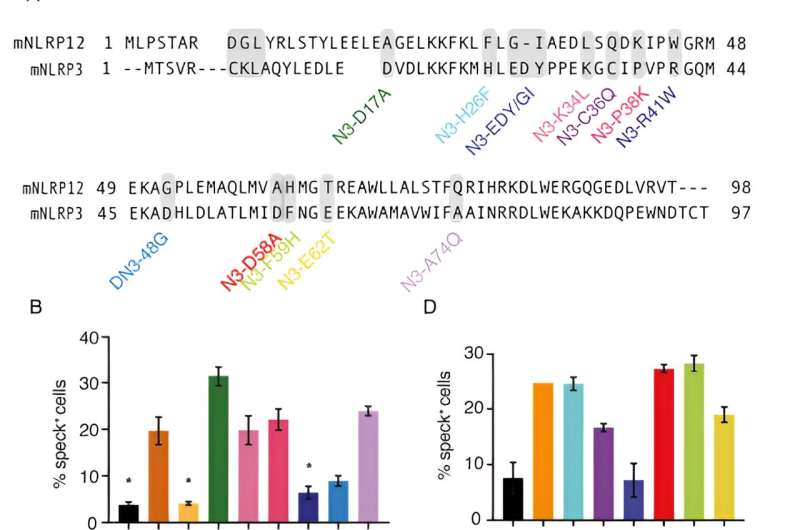This article has been reviewed according to Science X's editorial process and policies. Editors have highlighted the following attributes while ensuring the content's credibility:
fact-checked
peer-reviewed publication
trusted source
proofread
Inflammasome study offers hope for autoinflammatory disease treatment

University of Queensland researchers have discovered how the "on-switch" for the body's inflammation machinery can get stuck and cause rare genetic inflammatory diseases. Professor Kate Schroder and her team at UQ's Institute for Molecular Bioscience have been studying the NLRP3 inflammasome, a protein complex that drives inflammation.
The team involved IMB researchers, including Jared Coombs and Dr. Alina Zamoshnikova. The research paper was published in Science Signaling.
"The inflammasome protects us during infection by triggering an immune response, but it can also go wrong and cause uncontrolled inflammation and disease," Professor Schroder said.
"Autoinflammatory diseases occur when your body creates an immune response without a cue, ranging from very mild inflammation such as a rash, to life-threatening inflammatory responses leading to fever, blindness, deafness and cognitive decline.
"In those patients, there are mutations that stick the inflammasome on/off switch in the 'on' position so it is always firing, causing inflammation driven by a mutation instead of an infection or wound.
"The inflammation also can't be turned off without drug intervention."
Professor Schroder said the body's NLRP3 inflammasome is involved in neurogenerative diseases including Alzheimer's, inflammatory diseases such as arthritis, and cancer and gout.
"Our team found NLPR3 can be switched on permanently by a mutation in the protein NLRP12, with further tests revealing that NLRP12 also acts as a natural inhibitor to control NLRP3," she said.
"The two proteins are very closely related within the same family and like many siblings, one tries to control the other and stop it from doing what it wants to do."
Professor Schroder said because NLRP12 exists naturally in our cells, NLRP12 modulators may provide an effective treatment for people with autoinflammatory disease associated with overactive inflammasome NLRP3 signaling.
"There are artificial NLRP3 inhibitors currently in clinical trials, developed by our research team and others," she said.
"With our discovery that NLRP12 turns off NLRP3, we aim to make further inroads to understand these diseases."
More information: Jared R. Coombs et al, NLRP12 interacts with NLRP3 to block the activation of the human NLRP3 inflammasome, Science Signaling (2024). DOI: 10.1126/scisignal.abg8145



















